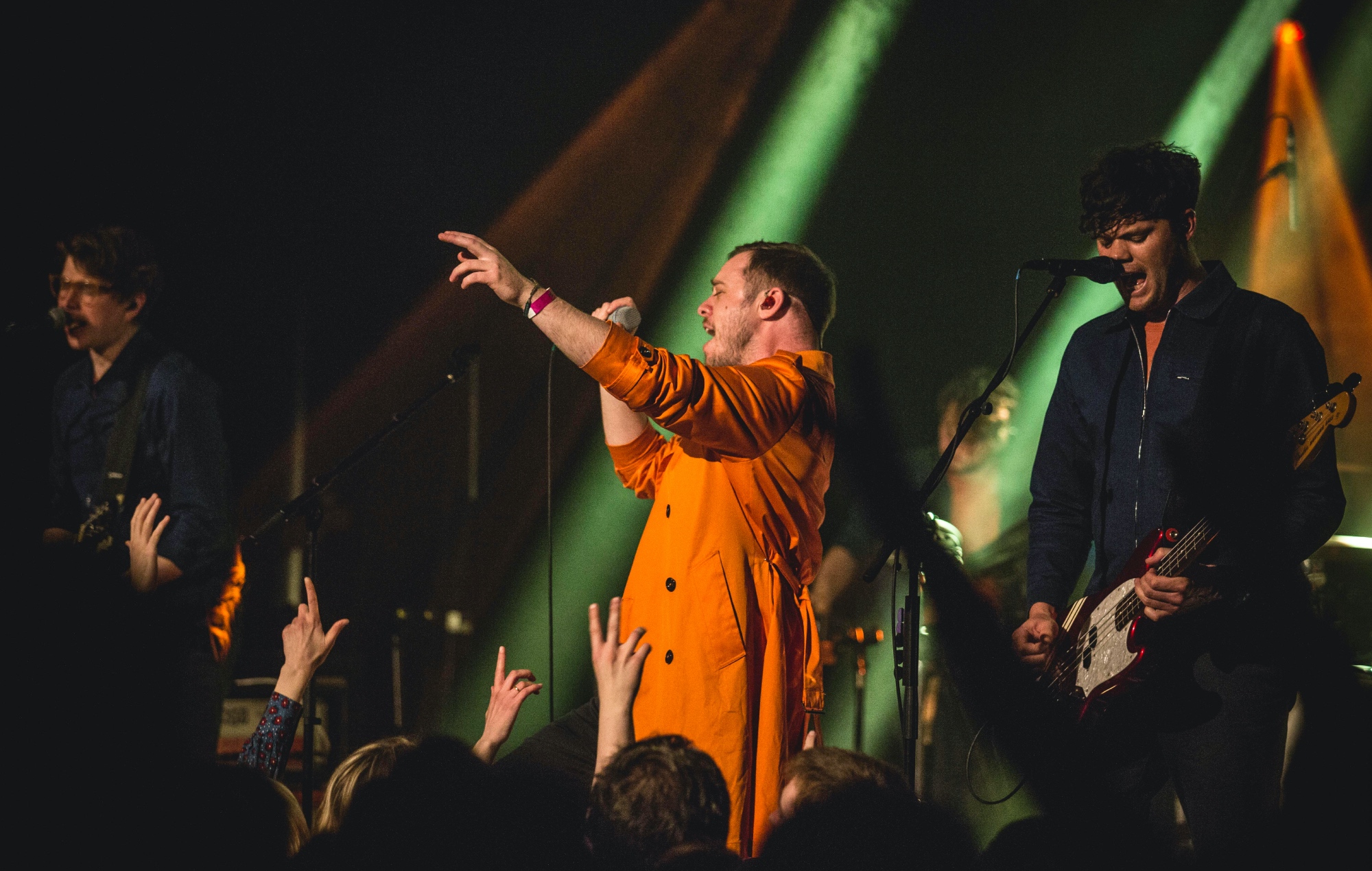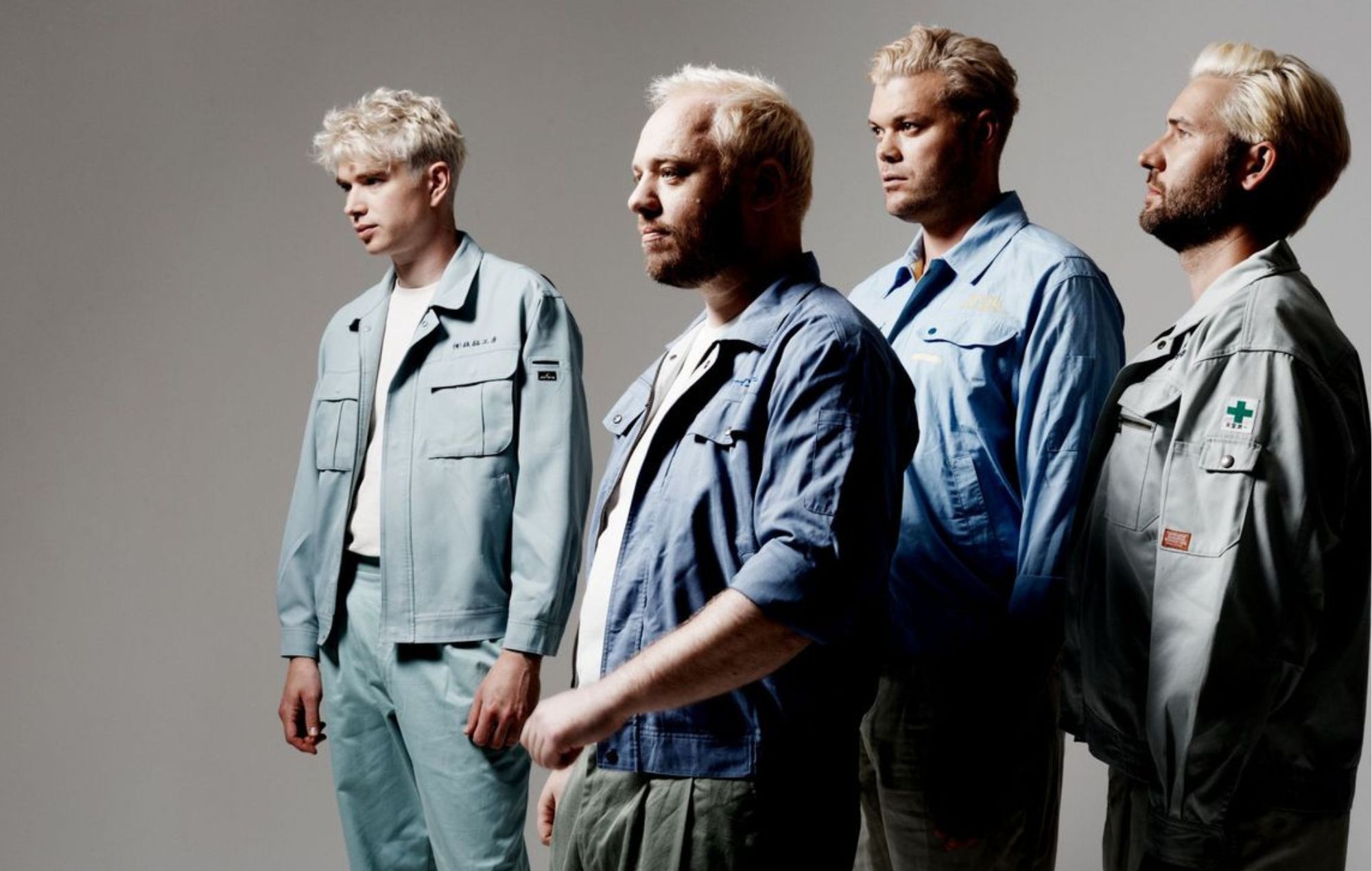
Everything Everything bassist Jeremy Pritchard has spoken to NME about his fears for the future of grassroots music venues in the UK, saying that “they are such a vital training ground” for new talent.
It has been a bumper 2024 for the Manchester art-rock group. Everything Everything’s seventh album ‘Mountainhead’ arrived in March to widespread acclaim, becoming their sixth consecutive record to crack the UK Top 10. Meanwhile, its single ‘Cold Reactor’ has grown into one of the band’s biggest streaming and airplay songs to date. The four-piece have also recently announced that they’ll hit the road at the end of the year for a UK headline tour.
Speaking to NME backstage at this summer’s All Points East festival, the band’s bassist – a longstanding Trustee at Music Venue Trust – reflected on the response to ‘Mountainhead’. Additionally, he discussed his first-hand experiences witnessing the issues facing small venues and called on new Culture Secretary Lisa Nandy to do more to protect them.
“We’re rightly proud of our live music pedigree in this country,” Pritchard told us. “We’ve had this amazing network of touring venues of a certain size – those 150-450 capacity venues – and they are such a vital training ground.
“They’ve produced a long list of festival headliners internationally. We cannot expect that sort of dominance to continue if we’re shutting down our own venues…and that’s on top of leaving the European Union, which was another thing we shouldn’t have done.”
Check out the full interview below, where Pritchard also shared his thoughts on the return of Oasis, looked back on the rise of AI since its incorporation on Everything Everything’s 2022 album, ‘Raw Data Feel’, and explained how the band’s “intimate” bond is now “Metallica-documentary level”.
Recommended
NME: Hi Jeremy. You have a longstanding history with Tunbridge Wells Forum. You’re also on the Board of Trustees at Music Venue Trust. What insights can you share with us about the plight of small music venues?
Jeremy Pritchard: “I’ve been aware of the struggle of grassroots venues for a long time. Way back, I volunteered and helped run one, and I saw how difficult it was to keep the lights on, keep the doors open, and keep everybody paid. About 10 years ago, I got involved with the Music Venue Trust. The charity has really helped change the conversation. I think people finally understand now that these places are, a) valuable; and b) under threat. It’s very sad.”
What tangible changes have you noticed?
“Music Venue Trust has made people value what we have left and want to protect it. They’ve also started buying up venues to keep them in public ownership. That way they can retain their status as music venues and not turn into hotels or Pizza Express restaurants.”
A degree of nationalisation.
“Exactly. A degree of nationalisation of our live music network. It’s like the National Trust or something. Live music is part of our heritage. I’ve known two of the guys that set up the [Music Venue Trust] charity since I was 14, because they ran the Tunbridge Wells Forum. They knew from experience just how tough it is for everybody.
“We were distributing Arts Council grants on a weekly basis during COVID and it was really heartwarming because it was so positive. We said yes to virtually every application. The applications were to keep these venues running for another month while they were dark. Sometimes they would be for as little as 600 quid. That was the difference between venues surviving or not. You could see that there’s no question of profiteering. It’s not that sort of industry. It’s done for a higher purpose.”
And the benefits of their survival aren’t just for bands, are they?
“No. Music venues provide a social function that traditional institutions like rugby clubs, for example, don’t provide. I wouldn’t have had anywhere to really go as a teenager without them. I would have been quite disenfranchised, I think. They are vital social spaces. It doesn’t matter if you’re in the band or not: it’s important for all sections of society.”
Are you hopeful that the new Labour government will advance this cause?
“I hope so. It’s a shame that [former Shadow Culture Secretary] Thangam Debbonaire lost her seat in Bristol because she was really good.”
Is new Culture Secretary, Lisa Nandy, making the right noises so far?
“She’s doing an alright job. She’s coming to it more from the sports angle than the arts angle. I understand that both have their place. I would just like her to be as engaged with what we do as she is with football.
“But she does understand, and the department understands, that there is a community aspect to this: grassroots venues are community resources. We’ve got a lot of community-owned pubs in the UK now, and I think we really need the same sort of thing for music venues.”
How are you feeling about the success of ‘Mountainhead’?
“It’s an enormous privilege that we’re still here seven albums in and still relevant to people in some way. I think that’s quite rare. Not only that, but we’re still getting radio play. We must be on the older side for Radio 1 now, but we still seem to be able to connect with young people. I’m happy the album’s connected with people, conceptually and emotionally.”

‘Mountainhead’ didn’t feature plug-ins or special effects. Was this a conscious reaction to the AI-assisted ‘Raw Data Feel’?
“Every album we make is largely a reaction to the ones that have come before. Obviously, we all have our favourite [records] but there’s a creative urge to keep moving forward: change the processes, change the parameters, etc.”
AI has come on leaps and bounds even in the two years since ‘Raw Data Feel’, hasn’t it?
“Yes! When we engaged with it on ‘Raw Data Feel’, we had to write to an academic at Durham University to work with machine learning. We sent it loads of text and asked it to write some poetry. We lifted a few lines and that was it. That was the only involvement we had with it, and it probably only affected about five per cent of the record. Six months later, ChatGPT was released, and the idea of using AI suddenly became quite pedestrian because anybody could access it.
“There was no question of us ever using it to write any music, whereas it’s obviously something that has become quite widespread – even more than we anticipated.”
You’ve been together a long time now. Does it become harder to manage your relationships as you get older?
“Well, all of a sudden, we’re into middle age. These are intimate relationships and we’re at the stage now where we’re bringing teenage relationships into our 40s, which is Metallica-documentary level!”
Perhaps it’s time for Some Kind Of Everything Everything Monster?
“[Laughs] Exactly! That is my favourite film, actually.”
Metallica’s Some Kind of Monster?
“Yes. And not because I’m a Metallica fan, but because it’s a great examination of male relationships in this very specific and unnatural context; one whereby you’re still hanging around the same people since you were 19 in your mid-30s and mid-40s. It just doesn’t really happen elsewhere in life. That’s something that I feel quite sentimental about. We’re quite different people in lots of ways and I think that we’ve learned to value that and harness it to the good, rather than allow it to divide us.”
Speaking of relationships, the Gallaghers have finally buried the hatchet. How are you feeling about the Oasis reunion?
“I DJ’d at one of the bars for Liam Gallagher’s Manchester ‘Definitely Maybe’ gigs and it was great. Those shows were great. Liam’s got a great-sounding band, but it will be even better to see the real deal. We never got [a reunion] with The Smiths and we never will. Oasis means a huge amount to a lot of people, and some of the music I’m just hugely fond of.”
Everything Everything’s 2025 UK tour kicks off in November. Find any remaining tickets here, and see the full schedule below.
NOVEMBER
15 – Bath, Komedia
DECEMBER
04 – Margate, Dreamland
06- Birmingham, O2 Institute
07 – Sheffield, Foundry
08 – Liverpool, O2 Academy
09 – Edinburgh, Assembly Rooms
11 – Newcastle, NX
12 – Norwich, Waterfront
13 – Brighton, CHALK
14 – Oxford, O2 Academy


 97
97